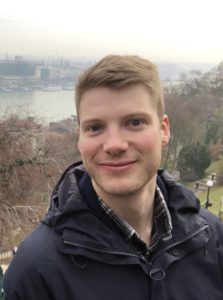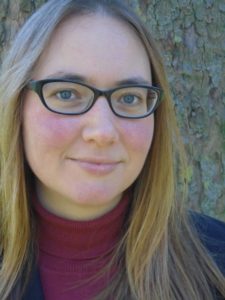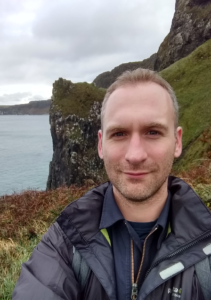Dr Tom Hulme – Principal Investigator
I ‘m a senior lecturer in modern British history at Queen’s University Belfast, where I’ve been working since Autumn 2016. Before that I was based in London for several years at both King’s College London and the School of Advanced Study, after finishing my PhD at the University of Leicester in 2013. My research is in two different (but sometimes overlapping!) areas. Firstly, the history of urban belonging and local citizenship from the late nineteenth to mid twentieth century. In my forthcoming book I use the former ‘shock cities’ of Manchester (UK) and Chicago (USA) as case studies to trace the rise and fall in importance of these ideals. I cover many different areas of thought and life, such as civic philosophy, urban festivals, youth culture, and public welfare. My second interest is in the place of the past in modern British culture, and specifically the ways in which peopled engaged with popular history in their own lives. I developed this interest when I was a postdoctoral researcher for a project on historical pageants in twentieth-century Britain. It was when I was doing this research on these massively popular historical reenactments that I first began to think more about the Mayflower story in British culture. Back in 1920, thousands of people across Britain – but particularly in Southampton and Plymouth – performed in local spectaculars that celebrated the importance of the Mayflower to the post-First World War world. Over the next few years I am excited to trace the myriad other ways that the famous Pilgrims have entered British culture both before and since.
‘m a senior lecturer in modern British history at Queen’s University Belfast, where I’ve been working since Autumn 2016. Before that I was based in London for several years at both King’s College London and the School of Advanced Study, after finishing my PhD at the University of Leicester in 2013. My research is in two different (but sometimes overlapping!) areas. Firstly, the history of urban belonging and local citizenship from the late nineteenth to mid twentieth century. In my forthcoming book I use the former ‘shock cities’ of Manchester (UK) and Chicago (USA) as case studies to trace the rise and fall in importance of these ideals. I cover many different areas of thought and life, such as civic philosophy, urban festivals, youth culture, and public welfare. My second interest is in the place of the past in modern British culture, and specifically the ways in which peopled engaged with popular history in their own lives. I developed this interest when I was a postdoctoral researcher for a project on historical pageants in twentieth-century Britain. It was when I was doing this research on these massively popular historical reenactments that I first began to think more about the Mayflower story in British culture. Back in 1920, thousands of people across Britain – but particularly in Southampton and Plymouth – performed in local spectaculars that celebrated the importance of the Mayflower to the post-First World War world. Over the next few years I am excited to trace the myriad other ways that the famous Pilgrims have entered British culture both before and since.
Dr Martha Vandrei – Co-Investigator
 I received my PhD from King’s College London in 2013 and I have been Lecturer (then Senior Lecturer) in Modern History at the University of Exeter’s idyllic Cornwall campus since September 2015. My research focuses on the history of culture and ideas in Britain, subjects which lend themselves to working across a broad chronology, spanning the early modern and modern periods, and in multiple disciplinary and generic modes. One of my particular interests is in the development of historical ideas as a diverse and yet enduring form of cultural production. I investigated this process at length in my recent book, published by Oxford University Press, Queen Boudica and Historical Culture in Britain: An Image of Truth. Although the book’s focus is on the reputation of the historical figure of Queen Boudica, as the subtitle ‘an image of truth’ suggests, I am keenly interested in the way ‘true’ stories are reimagined over time. This means being attentive both to the malleability, but also the integrity of historical stories, and to the ways audiences can both consume and create history. This means that, for me, the Mayflower story will be a fascinating example of how historical culture works, locally, regionally, nationally, and internationally. The voyage of 1620 has had so many different and changing resonances across a number of cultures and communities, and our project will be a really exciting opportunity for the team to investigate these resonances. My specific interest is in the intersection between religion and popular history, between antiquarianism and historical investigation, and between historical writing and dramatic representation. I am also keenly interested in tracing the development of history as a ‘public’ subject throughout the period.
I received my PhD from King’s College London in 2013 and I have been Lecturer (then Senior Lecturer) in Modern History at the University of Exeter’s idyllic Cornwall campus since September 2015. My research focuses on the history of culture and ideas in Britain, subjects which lend themselves to working across a broad chronology, spanning the early modern and modern periods, and in multiple disciplinary and generic modes. One of my particular interests is in the development of historical ideas as a diverse and yet enduring form of cultural production. I investigated this process at length in my recent book, published by Oxford University Press, Queen Boudica and Historical Culture in Britain: An Image of Truth. Although the book’s focus is on the reputation of the historical figure of Queen Boudica, as the subtitle ‘an image of truth’ suggests, I am keenly interested in the way ‘true’ stories are reimagined over time. This means being attentive both to the malleability, but also the integrity of historical stories, and to the ways audiences can both consume and create history. This means that, for me, the Mayflower story will be a fascinating example of how historical culture works, locally, regionally, nationally, and internationally. The voyage of 1620 has had so many different and changing resonances across a number of cultures and communities, and our project will be a really exciting opportunity for the team to investigate these resonances. My specific interest is in the intersection between religion and popular history, between antiquarianism and historical investigation, and between historical writing and dramatic representation. I am also keenly interested in tracing the development of history as a ‘public’ subject throughout the period.
Dr Edmund Downey – Research Associate
 I am a post-doctoral researcher specialising in the history of popular culture. With a background in literary studies, I am fascinated by the intersection between popular literature and our understanding of identity, history, and cultural narratives. My doctoral thesis examined the social and political context that informed the development of print-culture during the French Revolution and Romantic period. The events in France demonstrated the central role literature played in fermenting social change. Indeed, the revolutionaries carried printing presses through the streets of Paris to celebrate the role of print in delivering them from the oppression of the Ancien régime. However, the legacy of the French Revolution was fought over and contested for decades after the 1790s with poets, novelist, and painters all contributing to the development of our cultural memory concerning the historical event. It is this interest in ‘historical culture’ that first attracted me to this project. The original 1620 voyage of 102 Puritan separatists to present-day Massachusetts has had an extraordinary afterlife in the American and British historical imagination. The Mayflower has been interpreted as an origin myth for the founding of the United States and a justification for settler colonialism. On the other hand, mid-nineteenth century British and American abolitionists used the Mayflower story argue that the institution of slavery was incompatible with the English common law that the Puritans carried with them into New England. Later, in the early twentieth-century, America’s entry into WWI was termed ‘The Return of the Mayflower’ and government propagandists utilised the Mayflower narrative to help foster Anglo-American relations. The meaning of the Mayflower voyage has altered and shifted over four centuries to suit changing needs and agendas. My work on this project is to help recover examples of the long and protean legacy of the Mayflower story in British cultural history.
I am a post-doctoral researcher specialising in the history of popular culture. With a background in literary studies, I am fascinated by the intersection between popular literature and our understanding of identity, history, and cultural narratives. My doctoral thesis examined the social and political context that informed the development of print-culture during the French Revolution and Romantic period. The events in France demonstrated the central role literature played in fermenting social change. Indeed, the revolutionaries carried printing presses through the streets of Paris to celebrate the role of print in delivering them from the oppression of the Ancien régime. However, the legacy of the French Revolution was fought over and contested for decades after the 1790s with poets, novelist, and painters all contributing to the development of our cultural memory concerning the historical event. It is this interest in ‘historical culture’ that first attracted me to this project. The original 1620 voyage of 102 Puritan separatists to present-day Massachusetts has had an extraordinary afterlife in the American and British historical imagination. The Mayflower has been interpreted as an origin myth for the founding of the United States and a justification for settler colonialism. On the other hand, mid-nineteenth century British and American abolitionists used the Mayflower story argue that the institution of slavery was incompatible with the English common law that the Puritans carried with them into New England. Later, in the early twentieth-century, America’s entry into WWI was termed ‘The Return of the Mayflower’ and government propagandists utilised the Mayflower narrative to help foster Anglo-American relations. The meaning of the Mayflower voyage has altered and shifted over four centuries to suit changing needs and agendas. My work on this project is to help recover examples of the long and protean legacy of the Mayflower story in British cultural history.
